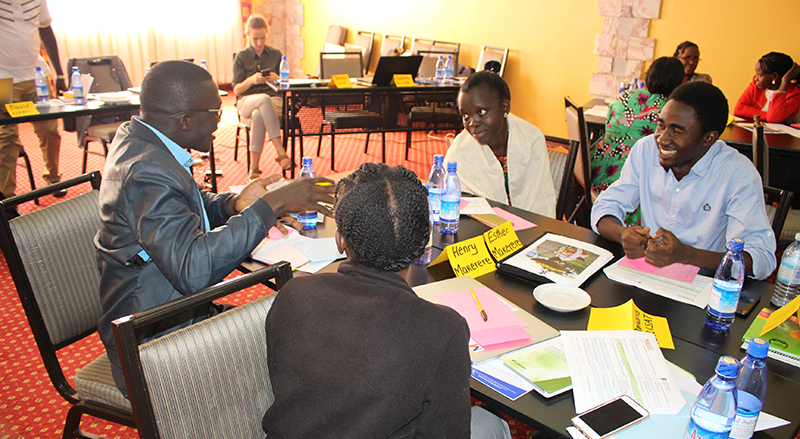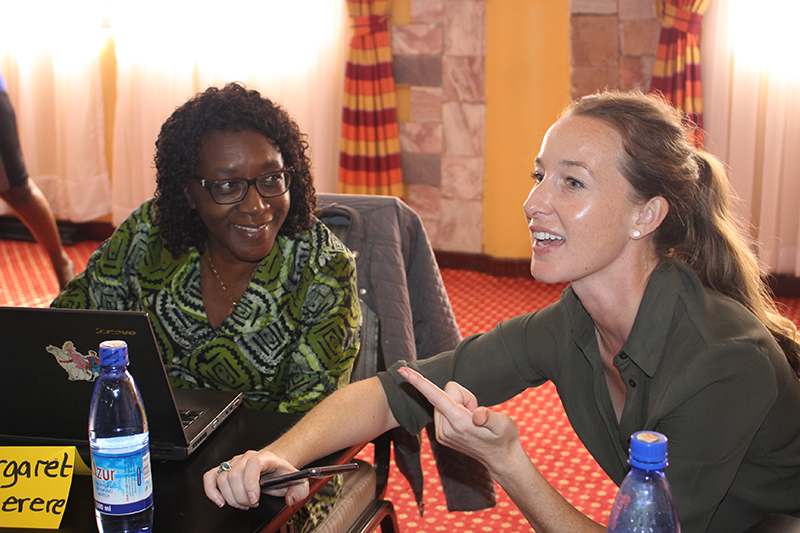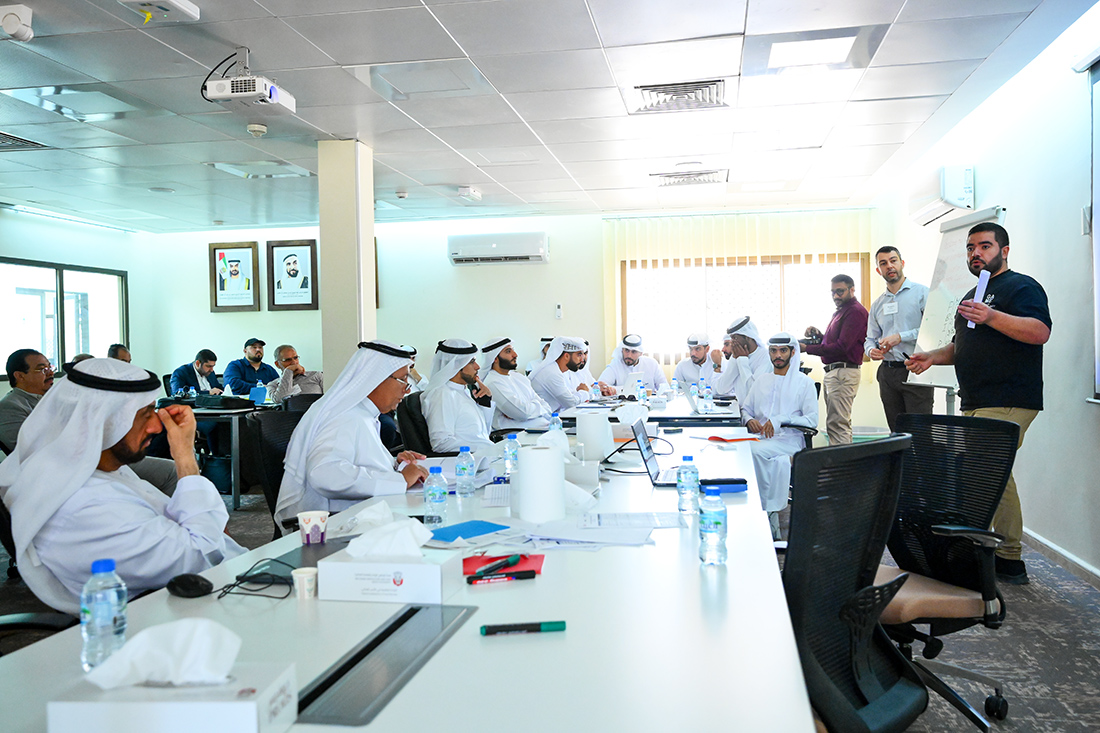The Feed the Future Innovation Lab for Peanut at the University of Georgia recently held three days of gender training executed by the GREAT (Gender-Responsive Researchers Equipped for Agricultural Transformation) team and Makerere University, the first in a series of intensive workshops to help researchers understand how best to consider gender in their work.
Headquartered at the UGA College of Agricultural and Environmental Sciences, the Peanut Innovation Lab started a five-year program in 2018 with gender at the forefront of research into peanut productivity and nutrition.
“From the first project proposals, scientists were asked to explain how they would make gender a consideration in their projects,” said Peanut Innovation Lab Director Dave Hoisington. “While gender is gaining attention as an important aspect of research, it also is a relatively new area for many of our scientists. We don’t expect everyone to come into the program with fully developed ideas about how gender influences their research questions and outcomes.
“We are learning lessons together and becoming better scientists along the way. That’s what makes this type of training invaluable.”
The GREAT training began by orienting the participants to the meaning of gender, and addressing the difference between gender and sex. While sex is biological, gender is socially constructed and involves the roles and behaviors we see as fitting for different people in different cultures.
“Training starts with the idea that you cannot or should not perform research in an area until you understand the cultural constructs — the gendered constructs – that are present,” said Jessica Marter-Kenyon, the post-doc fellow spearheading gender and youth focus for the Peanut Innovation Lab.
Considering gender roles doesn’t just mean looking at women’s lives, Marter-Kenyon points out. Men disproportionally bear certain burdens and risks in many places, such as exposure to pesticides, making it important to consider gender from all angles.
GREAT is a partnership between Makerere University and Cornell University (with support from the Bill and Melinda Gates Foundation) to provide applied gender training to agricultural researchers in sub-Saharan Africa. The team specifically addresses theory and practice of gender-responsive research, while seeking to increase opportunities for equitable participation and sharing of benefits from agricultural research to improve the outcomes for smallholder women farmers, entrepreneurs, and farmer organizations.
By building and engaging communities of researchers, GREAT seeks to equip scientists with the skills, knowledge, and support systems to develop and implement gender-responsive projects, making gender-responsiveness the norm and standard for agricultural research.
GREAT’s expertise and focus on sub-Saharan Africa made the group an obvious partner for the Innovation Lab, which has five projects specifically investigating gender and youth, but also considers gender a cross-cutting issue for all its projects. A portfolio of two dozen projects addresses variety development, value-added gains and nutrition, as well as gender and youth dynamics.
The course was different from GREAT’s more extensive conventional course, which equips participants with skills to conceptualize, implement, and communicate gender responsive research.
“The course was a departure from our usual courses,” said Margaret Mangheni, an associate professor in Makerere’s College of Agricultural and Environmental Sciences and co-PI of GREAT.
“Normally, the courses run between six and 14 days, coupled with fieldwork and mentorship. The Peanut innovation lab course was the first one of its kind where we tailored a few topics of the GREAT course to the Peanut IL context, running for three days for purposes of gender sensitization.
“The goal in this case was not in-depth skills development but enabling participants to get a good grasp of the gender concepts and to appreciate why gender matters in agricultural research in general and the peanut value chain in particular; and how to function in inter-disciplinary research teams.”
The workshop wasn’t designed to make participants into gender experts, Mangheni said, but to sensitize them to gender issues and allow experts to advise as projects continue.
Nearly 90% of participants said the training “greatly” changed their understanding of gender-responsive research, but one man succinctly described how in his exit survey: “The course has helped me to appreciate gender issues. My initial appreciation of gender issues was superficial. I thought it was primarily about women empowerment.”
The training, held March 10-12 in Kampala, brought together two dozen scientists and graduate students working on seven projects in southern Africa through the Peanut Innovation Lab. The participants came from disciplines as diverse as plant breeding, nutrition, agricultural economics, plant pathology and genetics. Several of the scientists also work for the national agricultural programs in their home countries, including representatives from Uganda, Malawi, Mozambique and Zambia.
David Okello, the principal groundnut breeder in Uganda and a key partner for many peanut-related research projects in the country, shared how his breeding program has integrated gender into its work – from learning to talk to men and women in different contexts, to understanding why farmers plant certain varieties, to choosing desirable traits that men and women farmers need.
“I now appreciate that there is heterogeneity within both men and women which affect choice and use of groundnut varieties. Even for a variety chosen jointly by both men and women, their utilization might differ. For example, with Serenut 14R, women choose it for butter whereas men chose it for confectionery,” Okello said. “I am increasingly conscious that the decision to adopt certain varieties is influenced in large part by gender, culture and norms. I incorporate gender disaggregated traits like cooking quality, taste, and drudgery reduction in our breeding program and purposely select who should test and select for some specialty traits. For example, women are best suited for selecting for cooking quality.”
Yield studies show a gap between what men and women achieve, both when using improved and when using non-improved varieties, Okello pointed out. The underlying cause may be resource allocation (input purchases), land allocation (women get the least fertile land and plant late in the season) and access to paid labor (when men control the money).
“I am aware of and appreciate the interdisciplinarity in our Groundnut Improvement Program, involving social scientists (economists, gender scientists and sociologists) working alongside biological scientists (pathologists, agronomists, entomologists, soil scientists, breeders and geneticists) all contributing to the entire value chain to identify problems, select traits, find the drivers of adoption and measure the success of groundnut improvement. Once you create the impact together, measuring it is easier, cheaper and understandable by all the team members.”
One of the goals of the training was to allow teams to consider their initial approach to gender and ask whether they have adequately addressed the issue. Teams met together to discuss what they had learned and take a hard look at their own projects.
“We wanted to be sensitive to the fact that they might not be able to add gender-specific questions to their research,” Marter-Kenyon said. “But the groups found unexpected steps that they could take. The result of training is that we have this group of people who are all thinking more critically about gender. Students will do their work differently because they had this training.”
This gender training changed my whole view of things,” said Henry Winkler, a Makerere University master’s student. “It gave me a better meaning to the reason for doing research, but also went beyond just the research to my family and personal life. The training led to a moment of self-assessment, actualization and re-alignment.
Under the guidance of PI Mike Deom of the University of Georgia, Winkler is researching whether a weed that grows in gardens might serve as an alternative host for the virus that causes groundnut rosette disease, which can destroy peanut crops. Following the training, Winkler is not only considering how women might be impacted if they are required to pull weeds more often, but also whether they could earn income by selling the weeds to men for livestock fodder, how they benefit financially from controlling the alternative host and how he will communicate his findings effectively to women in the future.
“It’s generally a big twist in mind to be gender sensitive in the whole research process and after the results so that the research meets the intended goals,” he said.
The training in Uganda is one of several gender training workshops the Peanut Innovation Lab has planned. Others in the U.S., Ghana and Senegal (in French) are planned.




